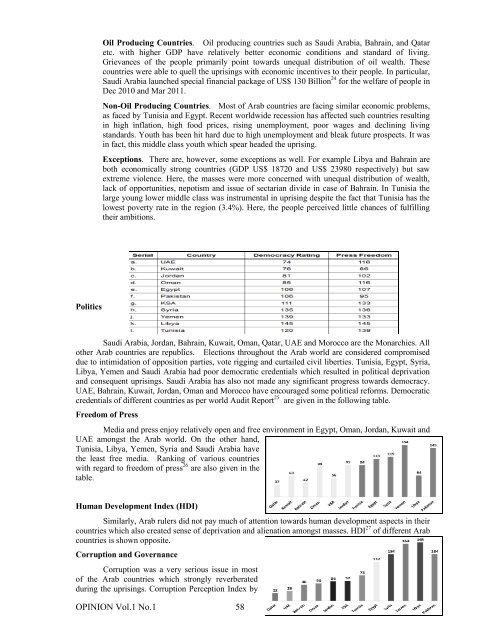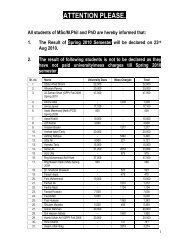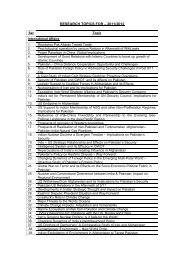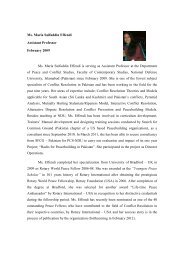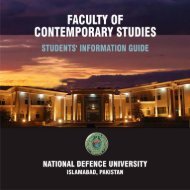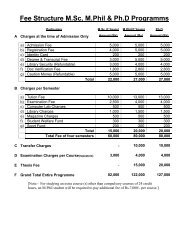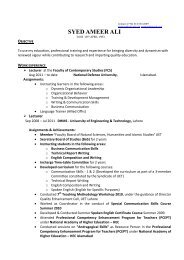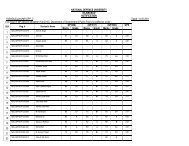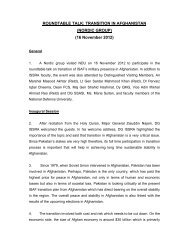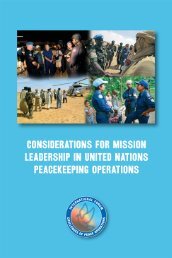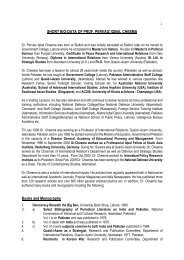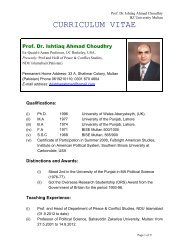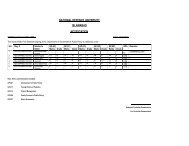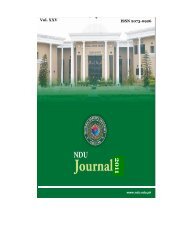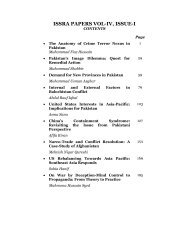OPINION Vol.1, No.1 June 2013 - National Defence University
OPINION Vol.1, No.1 June 2013 - National Defence University
OPINION Vol.1, No.1 June 2013 - National Defence University
Create successful ePaper yourself
Turn your PDF publications into a flip-book with our unique Google optimized e-Paper software.
Oil Producing Countries. Oil producing countries such as Saudi Arabia, Bahrain, and Qatar<br />
etc. with higher GDP have relatively better economic conditions and standard of living.<br />
Grievances of the people primarily point towards unequal distribution of oil wealth. These<br />
countries were able to quell the uprisings with economic incentives to their people. In particular,<br />
Saudi Arabia launched special financial package of US$ 130 Billion 24 for the welfare of people in<br />
Dec 2010 and Mar 2011.<br />
Non-Oil Producing Countries. Most of Arab countries are facing similar economic problems,<br />
as faced by Tunisia and Egypt. Recent worldwide recession has affected such countries resulting<br />
in high inflation, high food prices, rising unemployment, poor wages and declining living<br />
standards. Youth has been hit hard due to high unemployment and bleak future prospects. It was<br />
in fact, this middle class youth which spear headed the uprising.<br />
Exceptions. There are, however, some exceptions as well. For example Libya and Bahrain are<br />
both economically strong countries (GDP US$ 18720 and US$ 23980 respectively) but saw<br />
extreme violence. Here, the masses were more concerned with unequal distribution of wealth,<br />
lack of opportunities, nepotism and issue of sectarian divide in case of Bahrain. In Tunisia the<br />
large young lower middle class was instrumental in uprising despite the fact that Tunisia has the<br />
lowest poverty rate in the region (3.4%). Here, the people perceived little chances of fulfilling<br />
their ambitions.<br />
Politics<br />
Saudi Arabia, Jordan, Bahrain, Kuwait, Oman, Qatar, UAE and Morocco are the Monarchies. All<br />
other Arab countries are republics. Elections throughout the Arab world are considered compromised<br />
due to intimidation of opposition parties, vote rigging and curtailed civil liberties. Tunisia, Egypt, Syria,<br />
Libya, Yemen and Saudi Arabia had poor democratic credentials which resulted in political deprivation<br />
and consequent uprisings. Saudi Arabia has also not made any significant progress towards democracy.<br />
UAE, Bahrain, Kuwait, Jordan, Oman and Morocco have encouraged some political reforms. Democratic<br />
credentials of different countries as per world Audit Report 25 are given in the following table.<br />
Freedom of Press<br />
Media and press enjoy relatively open and free environment in Egypt, Oman, Jordan, Kuwait and<br />
UAE amongst the Arab world. On the other hand,<br />
Tunisia, Libya, Yemen, Syria and Saudi Arabia have<br />
the least free media. Ranking of various countries<br />
with regard to freedom of press 26 are also given in the<br />
table.<br />
Human Development Index (HDI)<br />
Similarly, Arab rulers did not pay much of attention towards human development aspects in their<br />
countries which also created sense of deprivation and alienation amongst masses. HDI 27 of different Arab<br />
countries is shown opposite.<br />
Corruption and Governance<br />
Corruption was a very serious issue in most<br />
of the Arab countries which strongly reverberated<br />
during the uprisings. Corruption Perception Index by<br />
<strong>OPINION</strong> <strong>Vol.1</strong> <strong>No.1</strong> 58 <strong>June</strong> <strong>2013</strong>


